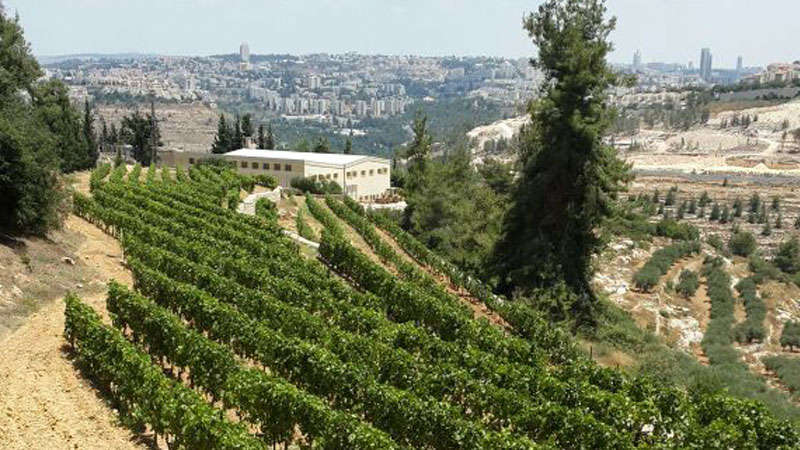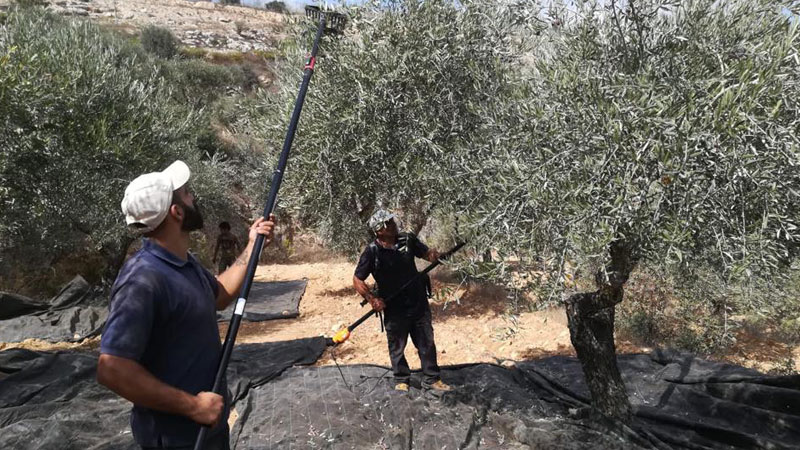As millions of people around the world prepare to celebrate Christmas, Bethlehem’s Cremisan Wine Estate has just finished bottling its 2018 vintage. Founded by Salesian monks in 1885, Cremisan makes wine using indigenous Palestinian grapes. Some scholars say these are the types of wines that Jesus most likely drank.
“The Salesian fathers started making the first wines, called Messa, to use in churches,” Fadi Batarseh, Cremisan’s winemaker, says. The monastery started making wines in the 1880s, using grapes that are at least 2,000 years old. Batarseh, a Palestinian Christian and Jerusalem native who studied winemaking in Italy, joined the winery in 2015. “We make a white and a red, both sweet, because Catholics use white wine for mass, and the Orthodox use red,” he says.
While winemakers in Israel’s Golan Heights have found success growing imported grapes like Syrah and Cabernet Sauvignon, Cremisan and select others are embracing the fruit that has grown in the region for centuries. Batarseh is leading the charge, incorporating modern technique and local, ancient grapes.
The results are smart, sophisticated wines that suit the region’s climate, made with grapes grown nowhere else in the world.

These include the red Baladi grape, as well as the Hamdani, Jandali, and Dabouki white grapes. Cremisan’s Hamdani and Jandali wine is made in a 50-50 blend that is crisp and citrusy and not aged in oak; nor is there oak in the Dabouki, which has more mineral overtones.
Batarseh also uses the Dabouki in a brandy that is aged 35 years and that has won a series of awards this year in both Israel and abroad. Most recently it won a double gold at the Israeli Terravino competition. All the barrels and machines Cremisan uses are imported from Italy.
“They were the first ones who took indigenous Palestinian grapes primarily grown as table grapes and turned them into good wine,” Israeli wine critic Jonathan Livny says of Cremisan’s success. “There are some very interesting wines coming from the Palestinian territory and Cremisan was the first to do this.”
Several Israeli wineries have since embraced ancient grapes. Recanati Winery in northern Israel makes a Marawi, another name for Hamdani, which is aged for a year. The grapes come from the Bethlehem area.
In 2013, Taybeh Winery opened in Taybeh, a Palestinian Christian village near Ramallah (the village is also home to an eponymous brewery, in operation since 1994). In addition to its Merlot, Cabernet, Syrah, and Sauvignon Blanc, Taybeh bottles Zeini, an indigenous Palestinian white grape. Zeini Blanc is a bright, highly acidic wine that is well suited for Middle Eastern heat.
“More and more people are realizing that Cabernet and Merlot, which are the most prevalent wines in the world, are not suitable for Israel, although they grow so well here,” Livny says. “They are heavy wines, but here the climate is so hot that you want something lighter.”
Wine has been made in the Middle East for thousands of years, but the industry went into hibernation when the Ottoman Empire, which is Muslim, ruled what is now Israel and the West Bank. Religiously observant Muslims abstain from drinking alcohol.
While there has been a wine renaissance in Israel since the 1990s, with over 300 wineries today, modern Palestinian wine culture is still nascent. Only about 2 percent of the Palestinians in the West Bank are Christians, and the rest are Muslims.
Cremisan is just a few miles from Jerusalem, on the outskirts of Bethlehem. The winery is stunningly beautiful, with green hills more reminiscent of Tuscany than the hardscrabble West Bank. There are terraces and hundreds of ancient olive trees that also make excellent olive oil, which the winery also markets. The grapes come from both the monastery’s own plots as well as from Palestinian farmers in Hebron, about 15 miles south of Bethlehem. The area has long been famous in Palestinian lore for its table grapes.

The name Cremisan comes from the Hebrew Kerem Zan, which means vineyard of Zan, one of the local grapes. The Hebrew word “zan” also means varietal.
Cremisan was established by a young Italian missionary, Father Antonio Bellone, in 1885, with the goal of creating work for poor people in the area. Sales of Cremisan wines also helped support the orphanages he opened in Bethlehem and Beit Gemal.
Today, the winery’s mission has not changed. The few remaining Salesian monks still help with winery production and bottling. Profits are still used to help Palestinian orphans. In the past few years, they have expanded to aid children affected by the civil war in Syria.
